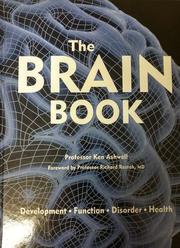Detailansicht
The Brain Book
ISBN/EAN: 9781420256840
Umbreit-Nr.: 3267093
Sprache:
Englisch
Umfang:
Format in cm:
Einband:
gebundenes Buch
Erschienen am 18.09.2012
Auflage: 1/2012
- Zusatztext
- The Brain Book investigates the amazingly complex and intriguing structure that is the human brain. Made up of billions of nerve cells, the brain controls our thoughts, movements, behaviour and emotions. This comprehensive book explores such diverse topics as how we sense the world, consciousness and memory, through to diseases and disorders, the ageing brain and spinal injury repair. Containing the latest medical research, The Brain Book explains in concise, clear language important health issues such as the effects of recreational drugs and medicines on the brain, strokes, tumours and the biological basis of mental illness. Hundreds of colour images, including stunning 3-D illustrations created exclusively for this book, reveal the intricate workings of the brain to show incredible details beyond what the eye can usually see.
- Kurztext
- The Brain Book investigates the amazingly complex and intriguing structure that is the human brain. Made up of billions of nerve cells, the brain controls our thoughts, movements, behaviour and emotions. This comprehensive book explores such diverse topics as how we sense the world, consciousness and memory, through to diseases and disorders, the ageing brain and spinal injury repair. Containing the latest medical research, The Brain Book explains in concise, clear language important health issues such as the effects of recreational drugs and medicines on the brain, strokes, tumours and the biological basis of mental illness. Hundreds of colour images, including stunning 3-D illustrations created exclusively for this book, reveal the intricate workings of the brain to show incredible details beyond what the eye can usually see. Key Features - Covers all major brain health issues, including depression, schizophrenia, dementia, and the ageing brain - Nearly 200 full-colour digital illustrations make it easier to internalise a dynamic working model of brain function that will aid in understanding the brain at every level - A lucid overview of the brain that is presented in easily understandable language and does not assume any previous knowledge in the subject.
- Autorenportrait
- Dr. Ken Ashwell - Consultant Editor Professor of Anatomy in the School of Medical Sciences, Faculty of Medicine, at the University of New South Wales, Sydney, Australia. Dr. Ashwell was the Chief Consultant for Anatomy Colour-in Flash Cards and The Human Body Identification Manual. Consultants for The Brain Book Foreword by Dr. Richard Restak Clinical Professor of Neurology at George Washington Hospital University, School of Medicine and Health Sciences, Washington, D.C. Dr. Restak is a neuropsychiatrist and clinical professor at George Washington University. He is the author of 18 books on the human brain, including the New York Times bestseller The Brain (1991), as well as The Secret Life of the Brain (2001), the companion book for the acclaimed PBS series of the same name. He has penned dozens of articles for national newspapers including the Washington Post, New York Times, Los Angeles times, and USA Today; he has contributed brain and neuroscience-related entries for the World Book Encyclopedia, the Campton's Encyclopedia, the Encyclopedia Britannica, and the Encyclopedia of Neuroscience. Dr. Kurt Albertine Professor, Pediatrics, Medicine (Adjunct), Neurobiology & Anatomy (Adjunct) Training Director, Children's Health Research Center, Department of Pediatrics Director, Health Sciences Center Research Microscopy Facility Dr Albertine has consulted on numerous titles for Global Book Publishing, including as Chief Consultant for Anatomica and The Human Body Atlas. Dr. Karl Pribram Professor at Georgetown University, Washington, D.C.; Emeritus professor of psychology and psychiatry at Stanford University and Radford University. Board-certified as a neurosurgeon, Pribram is best known to the general public for his development of the holonomic brain model of cognitive function and his contribution to ongoing neurological research into memory, emotion, motivation, and consciousness. Most of his career has been devoted to brain behavior research which he pursued at the Yerkes Laboratory of Primate Biology; at Yale University where Pribram taught neurophysiology and physiological psychology; and for thirty years at Stanford University where he received a lifetime career award from the National Institutes of Health as Professor of Neuroscience in the Departments of Psychology and Psychiatry.
